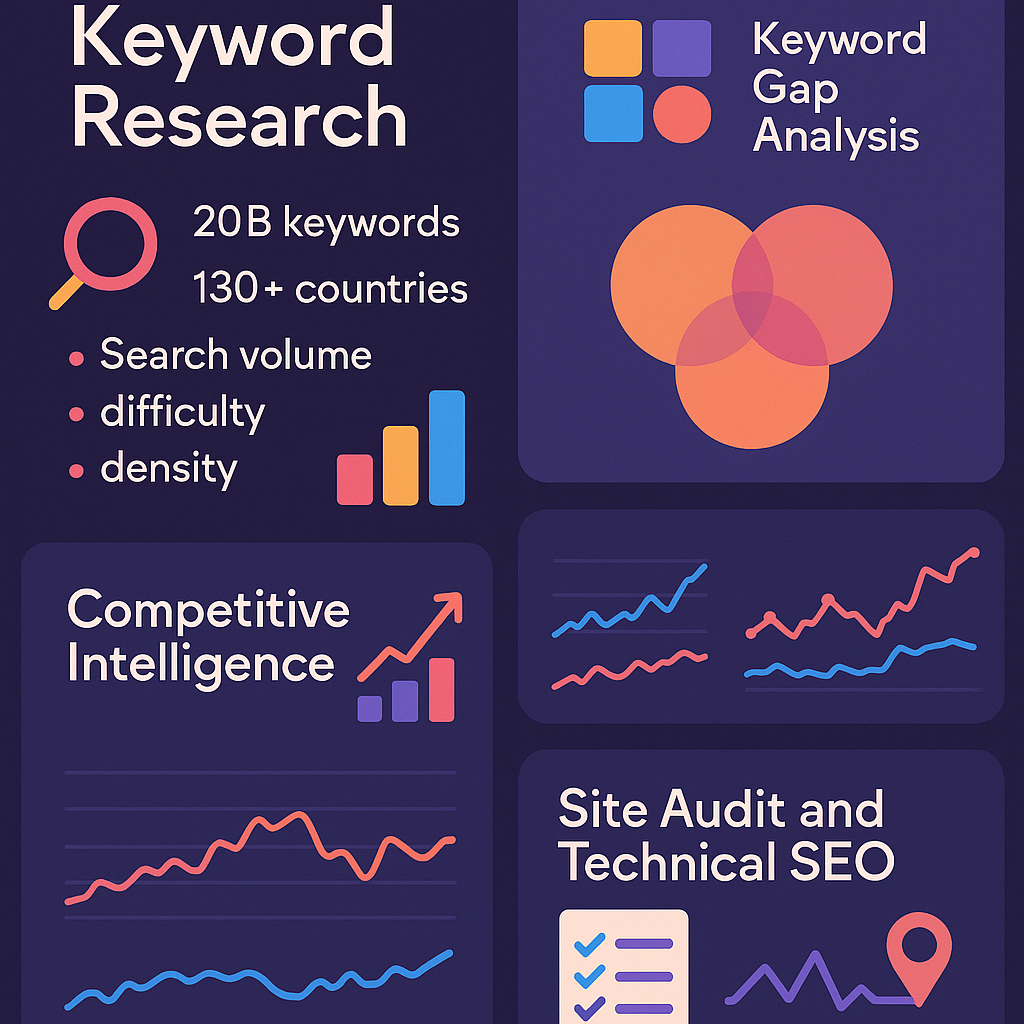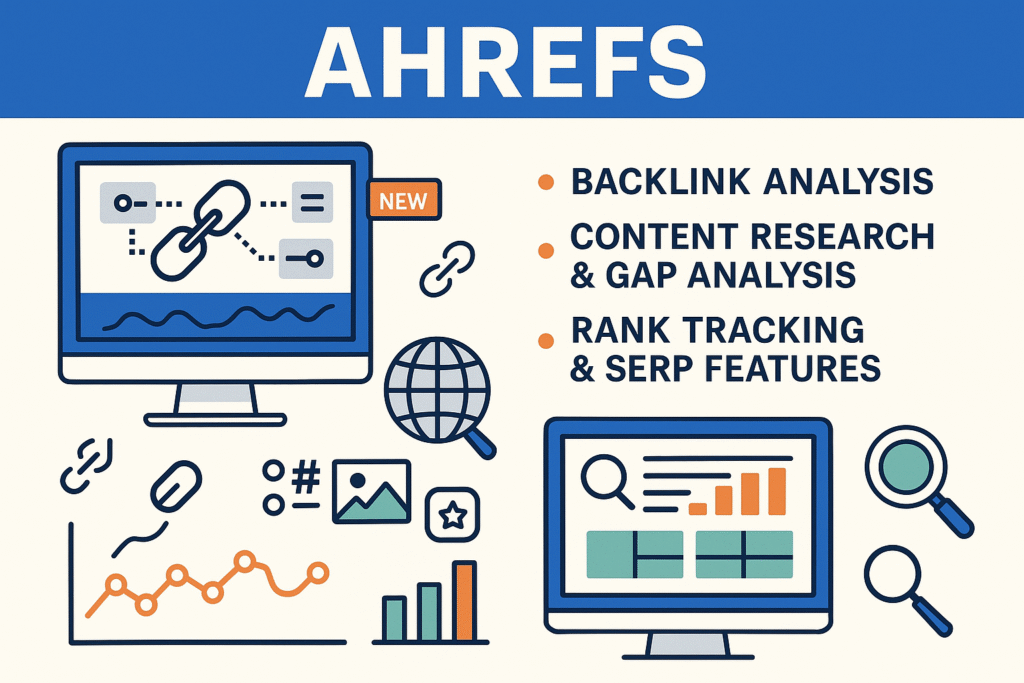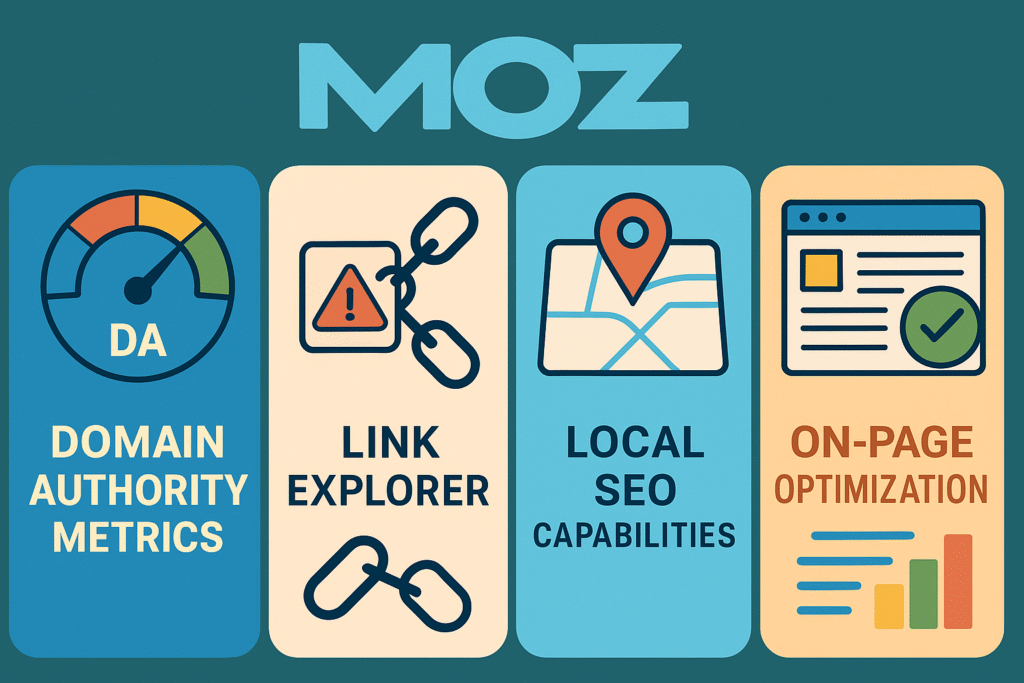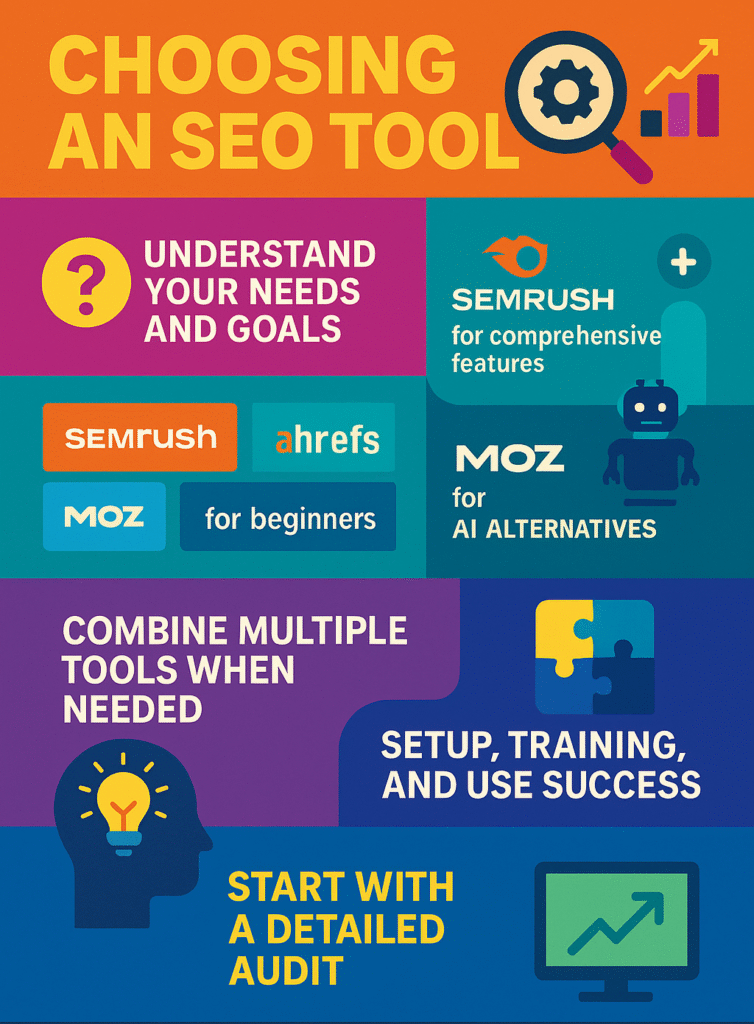Table of Contents
Finding the right SEO tool can make or break your digital marketing success. With countless options available, choosing between platforms like SEMrush, Ahrefs, Moz, and emerging AI alternatives often feels overwhelming.
Most marketers struggle with scattered data, incomplete keyword research, and tracking performance across multiple campaigns. The wrong tool wastes time, money, and opportunities while competitors gain ground with better insights.
Need of SEO tools
Modern SEO requires more than guesswork and basic analytics. Professional SEO tools provide the data foundation that successful campaigns depend on.
Search engines process billions of queries daily. Without proper tools, businesses miss critical opportunities to connect with their target audience. These platforms reveal what competitors rank for, which keywords drive traffic, and how to improve existing content.
Professional tools also save hundreds of hours monthly. Manual keyword research that once took weeks now completes in minutes. Rank tracking across thousands of terms happens automatically. Technical audits identify issues before they impact rankings.
The difference between businesses that grow online and those that stagnate often comes down to the quality of their SEO data and how effectively they use it.
SEMrush Features and Capabilities

SEMrush stands as one of the most comprehensive digital marketing platforms available today. The tool combines SEO, PPC, content marketing, and social media analytics in a single interface.
Keyword Research and Analysis
SEMrush’s keyword research capabilities span over 20 billion keywords across 130+ countries. The platform reveals search volume, keyword difficulty, and competitive density for any term. Users can discover related keywords, question-based queries, and long-tail variations that competitors might miss.
The tool’s keyword gap analysis feature compares up to five domains simultaneously. This reveals opportunities where competitors rank but the user’s site doesn’t. Content teams use this data to identify high-value topics for new articles and page optimizations.
Competitive Intelligence
The competitive research features give users unprecedented insight into rival strategies. SEMrush shows which keywords competitors rank for, their top-performing content, and their backlink profiles. The traffic analytics reveal competitor traffic trends and top traffic-driving pages.
PPC intelligence exposes competitor ad strategies, including ad copy, landing pages, and bidding keywords. This information helps businesses avoid costly trial-and-error in their own paid campaigns.
Site Audit and Technical SEO
SEMrush’s site audit crawls websites to identify technical issues that impact search performance. The tool flags broken links, missing meta descriptions, slow-loading pages, and mobile usability problems. Each issue includes priority levels and step-by-step fix instructions.
The position tracking feature monitors keyword rankings across different locations and devices. Users can track progress for thousands of keywords and receive alerts when significant ranking changes occur.
Ahrefs Strengths and Features

Ahrefs built its reputation on having the world’s largest database of live backlinks. The platform crawls over 6 billion pages daily and maintains fresh data on more than 170 million domains.
Backlink Analysis
Ahrefs’ Site Explorer provides the most detailed backlink analysis available. Users can see every link pointing to any website, including the anchor text, link strength, and whether links are new or lost. The tool identifies the most valuable link opportunities by analyzing competitor backlink profiles.
The broken link checker helps users reclaim lost link equity by finding and fixing broken internal links. External broken link analysis reveals opportunities to earn links by helping other sites fix their broken resources.
Content Research and Gap Analysis
Ahrefs’ Content Explorer searches through billions of web pages to find the most shared and linked-to content on any topic. Content creators use this to identify trending topics, understand what type of content performs best, and find link building opportunities.
The content gap tool reveals keywords that competitors rank for but the user’s site doesn’t. This feature has helped countless websites discover high-value keywords they never considered targeting.
Rank Tracking and SERP Features
Ahrefs tracks keyword rankings with daily updates and shows SERP feature visibility including featured snippets, image packs, and knowledge panels. The tool monitors ranking changes and provides detailed reports on which pages gained or lost visibility.
The keyword difficulty metric helps users prioritize which keywords to target based on the strength of currently ranking pages. This prevents wasting effort on impossibly competitive terms.
Moz Features

Moz focuses on making SEO accessible to businesses of all sizes. The platform emphasizes education alongside tools, helping users understand not just what to do, but why certain strategies work.
Domain Authority Metrics
Moz’s Domain Authority (DA) and Page Authority (PA) metrics have become industry standards for measuring website strength. These scores predict how well sites and pages will rank in search results based on link profiles and other factors.
The Link Explorer tool provides detailed backlink analysis with Moz’s proprietary spam score. This helps users identify potentially harmful links that could damage their search performance.
Local SEO Capabilities
Moz Local helps businesses manage their presence across local directories and maps. The tool identifies inconsistent business listings, monitors online reviews, and tracks local search rankings across different geographic areas.
Local businesses particularly benefit from Moz’s citation audit features and review monitoring capabilities. The platform connects local visibility improvements directly to increased customer acquisition.
On-Page Optimization
The Page Optimization feature analyzes individual pages and provides specific recommendations for improvement. The tool checks title tags, meta descriptions, content length, and internal linking structure against ranking factors.
Moz’s SERP analysis shows what currently ranks for target keywords and identifies common characteristics among top-performing pages. This data guides content optimization decisions with concrete examples of what works.
AI-Powered SEO Alternatives
Artificial intelligence is transforming how SEO tools collect, analyze, and present data. Several platforms now use machine learning to provide more accurate predictions and automated optimizations.
Automated Content Optimization
AI-powered tools can now analyze top-ranking content and generate optimization suggestions automatically. These platforms identify semantic keywords, optimal content length, and structural elements that improve search performance.
Some AI tools integrate directly with content management systems to provide real-time optimization suggestions as users write. This approach helps create SEO-friendly content without requiring extensive technical knowledge.
Predictive Analytics
Machine learning algorithms can predict ranking changes, traffic fluctuations, and competitive movements before they happen. These insights help businesses adjust strategies proactively rather than reactively.
AI tools analyze search trends, seasonal patterns, and algorithm updates to forecast future opportunities and challenges. This capability becomes particularly valuable for businesses planning content calendars and SEO budgets.
Natural Language Processing
Advanced AI platforms understand search intent better than traditional keyword-based tools. They analyze how people actually search and what they expect to find, leading to more effective content strategies.
These tools can identify topic clusters, related concepts, and semantic relationships that improve content relevance and search visibility. The technology helps bridge the gap between what users search for and what content actually provides.
Tool Comparison
Choosing the right SEO tool depends on specific business needs, budget constraints, and team capabilities. Each platform excels in different areas and serves different types of users.
Budget Considerations
SEMrush offers the most features but at a higher price point. The platform suits agencies and larger businesses that need comprehensive digital marketing capabilities beyond just SEO. Smaller businesses might find the feature set overwhelming and expensive.
Ahrefs provides excellent value for businesses focused primarily on link building and competitor analysis. The pricing is competitive, and the backlink data quality justifies the cost for most serious SEO practitioners.
Moz targets small to medium businesses with straightforward pricing and educational resources. The platform works well for businesses new to SEO or those that prefer simplicity over advanced features.
AI alternatives often offer lower entry costs but may lack the comprehensive data that established platforms provide. These tools work best when combined with traditional SEO platforms rather than as complete replacements.
Team Size and Expertise
Large teams benefit from SEMrush’s collaborative features and comprehensive reporting capabilities. The platform can serve multiple departments and integrate with existing marketing workflows.
Small teams or solo practitioners might prefer Ahrefs’ focused approach to core SEO functions. The learning curve is gentler, and the interface prioritizes the most important metrics.
Businesses without dedicated SEO staff should consider Moz’s educational approach and guided recommendations. The platform helps users understand why certain actions matter, not just what to do.
Specific Use Cases
E-commerce businesses benefit from SEMrush’s comprehensive competitor analysis and PPC intelligence features. The platform helps identify profitable keywords and understand competitor pricing strategies.
Content publishers and bloggers often prefer Ahrefs for its superior content research capabilities and backlink analysis. The platform excels at identifying trending topics and link building opportunities.
Local businesses should prioritize Moz’s local SEO features and citation management capabilities. The platform addresses the unique challenges of local search visibility and reputation management.
Impact of SEO tools
Quality SEO tools transform how businesses approach content creation and optimization. The data these platforms provide guides every aspect of content strategy, from topic selection to performance measurement.
Data-Driven Content Planning
SEO tools reveal which topics audiences actually search for and how competitors approach those subjects. This information prevents businesses from creating content that nobody wants to read.
The best platforms identify content gaps where audience demand exists but competition remains manageable. These opportunities allow businesses to establish authority in profitable niches before competitors catch up.
Seasonal trend data helps plan content calendars that align with natural search patterns. Understanding when people search for specific topics allows businesses to publish content at optimal times for maximum visibility.
Performance Measurement
Regular tracking shows which content drives organic traffic and conversions. This data helps businesses double down on successful content types while abandoning strategies that don’t work.
Brand storytelling becomes more effective when guided by search data that reveals how audiences actually discuss topics and problems. SEO tools provide the language and concepts that resonate with real searches.
Technical audits identify issues that prevent content from reaching its potential audience. Fixing these problems often provides immediate traffic improvements without creating new content.
Technical Implementation and Setup
Proper tool implementation determines how much value businesses extract from their SEO platform investment. Each tool requires specific setup procedures and ongoing maintenance to deliver accurate data.
Account Configuration and Goals
Setting up SEO tools correctly requires defining clear goals and configuring tracking parameters that align with business objectives. Poor initial setup leads to unreliable data and misguided optimization efforts.
Most platforms require connecting Google Analytics, Search Console, and other data sources. These integrations provide richer insights but need proper configuration to maintain data accuracy.
Regular audits ensure tracking continues working correctly as websites and business goals evolve. Technical changes can break tracking connections and lead to data gaps that impact decision-making.
Team Training and Adoption
The most powerful SEO tools remain useless if teams don’t understand how to use them effectively. Successful implementation includes training programs that help team members extract actionable insights from available data.
Creating immersive content experiences requires understanding how SEO tools identify trending topics and audience preferences. Teams that master these connections create more engaging content that also ranks well in search results.
Different team members need different training approaches. Content creators focus on keyword research and topic identification, while technical staff concentrate on audit tools and implementation recommendations.
Measuring ROI and Success Metrics
SEO tool investments must demonstrate clear returns to justify ongoing costs. The best platforms provide reporting that connects SEO improvements with business outcomes like revenue, leads, and customer acquisition.
Traffic and Ranking Improvements
Basic success metrics include organic traffic growth, keyword ranking improvements, and search visibility increases. These metrics show whether SEO efforts are moving in the right direction.
More sophisticated analysis connects traffic improvements with conversion rates and revenue attribution. Understanding which keywords and pages drive actual business results helps prioritize optimization efforts.
Long-term trend analysis reveals whether improvements are sustainable or just temporary fluctuations. Consistent growth patterns indicate successful strategies that deserve continued investment.
Competitive Advantage Measurement
The best SEO tools help businesses understand their competitive position and identify opportunities to gain market share. Regular competitive analysis reveals where businesses lead and where they lag behind rivals.
Brand consistency across all digital touchpoints becomes easier to maintain when SEO tools provide unified performance data. Teams can ensure messaging remains consistent while optimizing for different keywords and audiences.
Conclusion
Selecting the right SEO tool shapes every aspect of digital marketing success. SEMrush offers comprehensive features for larger teams, Ahrefs excels in backlink analysis and content research, Moz provides beginner-friendly guidance with solid fundamentals, and AI alternatives bring automation and predictive capabilities.
The best choice depends on specific business needs, team size, budget constraints, and growth goals. Most successful businesses find value in combining multiple tools rather than relying on a single platform.
Success with any SEO tool requires proper setup, team training, and consistent use over time. The platforms provide data and insights, but human expertise transforms that information into effective strategies that drive real business results.
Start with a clear understanding of current SEO challenges and goals. Try free trials of leading platforms to evaluate which interface and feature set best fits existing workflows. Remember that the most expensive tool isn’t always the best choice – the right tool is the one teams will actually use consistently to improve search performance.
Begin with a detailed audit of current search performance using SEO keyword research techniques, then select the platform that best addresses identified gaps and opportunities. The investment in professional SEO tools typically pays for itself within the first few months through improved search visibility and organic traffic growth.
Frequently Asked Questions
Which SEO tool is best for beginners?
Moz provides the most beginner-friendly interface with extensive educational resources. The platform guides new users through SEO concepts while providing actionable recommendations. Small businesses and solo practitioners often find Moz’s approach less overwhelming than more feature-rich alternatives.
How much should businesses budget for SEO tools?
Professional SEO tool costs range from $99 to $500+ monthly depending on features and data requirements. Most small businesses find value in the $150-300 monthly range, while larger organizations may need enterprise plans. The investment typically pays for itself through improved search performance and time savings.
Can free SEO tools provide adequate results?
Free tools like Google Search Console provide valuable basic data but lack the comprehensive analysis needed for competitive industries. Businesses serious about SEO success typically need paid tools for keyword research, competitor analysis, and detailed performance tracking.
How often should businesses change SEO tools?
Most businesses benefit from sticking with one primary platform for at least 12-18 months to build historical data and team expertise. Switching tools frequently prevents teams from mastering capabilities and disrupts performance tracking. Annual reviews help determine if current tools still meet evolving business needs.
Do AI-powered SEO tools replace traditional platforms?
AI tools currently supplement rather than replace traditional SEO platforms. The best approach combines AI-powered insights with comprehensive data from established tools. As AI capabilities improve, this balance may shift toward more automated solutions.
